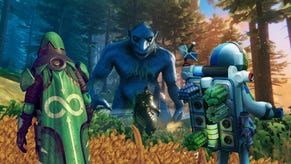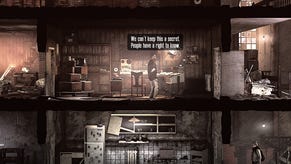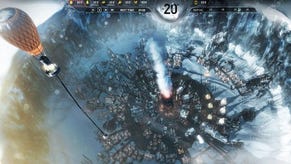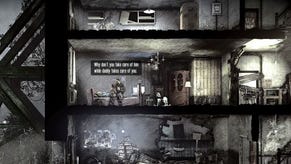Hands-On: This War Of Mine
I'm gonna let it shine
This War Of Mine is a game set in the ruins of a wartorn city. Rather than playing a soldier on either side of the conflict, as is traditional in the world of games, players control a group of civilians who are trying to survive in a place where the essentials of life are thin on the ground. The game doesn't match its mechanics to its theme as smoothly and powerfully as Papers, Please, instead opting to tread unfamiliar ground in familiar shoes. It's a resource management game, in which survivors craft, explore and scavenge to survive. I played through the first few days and discovered the irony of it all.
A group of survivors shelter in the ruins of a stranger's home. They are refugees within their own city, scavenging for food and medicine. One of them, a celebrated football player in a past life, has a fever. He doesn't sleep well at night, shivering and sweating by the makeshift heater as it consumes the last of the wood. Tomorrow, they'll resort to burning their books as the cold and the dark close in.
This War Of Mine is bleak but, to its credit, it's also pragmatic. At the beginning of each playthrough, you're in control of three people who have found themselves living under the same bomb-scarred roof in a wartorn city. Clicking on either a person or his/her portrait selects that individual, and clicking on icons scattered around the building sets the chosen survivor to work. Activities include clearing debris, crafting, cooking and searching for supplies in a specific area.
Play is divided up into days and nights, the former occurring in real time and the latter passing in the forty winks of an eye unless a character is sent out into the city to scavenge. Those missions are controlled directly, with the same interface used to give commands back at the base. It's a busy game rather than a reflective one, and after the initial surprise I found the pace and style were suited to the setting.
This War of Mine doesn't aim to overwhelm with depictions of horror and sorrow, and that's because its player characters aren't overwhelmed. They are working toward their own survival and that requires a focus on the task at hand, no matter how terrible the situation might be. It's a game of simple routines and occasional decisions - is it better to gather water or to build beds? Are tins of food more valuable than bullets?
The blend of resource and time management (though not in the rapid, obsessively perfection-seeking Diner Dash sense) teeters on the verge of banality, and I imagine some people will find it off-putting. There isn't a great deal of freedom during the first days, when resources are rare and only basics can be built. The game reveals its mind and heart during the nightly excursions, however, which increasing the stakes, the tension and the potential for fatal errors.
There are three possible locations to scavenge, with more to be revealed as time passes, I'd imagine. At the start of each game, the locations are randomised, like the group of survivors, although they're selected from a pool of possibilities rather than generated on the fly. My most memorable encounter took place in the ruins of a garage.
Pointing and clicking my way through the building, I'd collected weapon parts, bundles of food and tobacco, and enough piles of scrap to build a metal crafting table. Valuable loot indeed. But then I saw red pulses in the room next door, moving toward the door, hesitant. Footsteps, the sound displayed so that I can keep track of the possible danger.
Despite the reliance on a point and click interface, scavenging missions are tense and offer decent stealth mechanics. Characters sneak around by default, nervously glancing over their shoulders and from side to side as they go, and they can peer through keyholes, throwing a narrow cone of vision into the next room, faltering and twitching as the observer seeks threats and treasures. I didn't have the guts to check who was on the other side of the door though - I had a feeling THEY were looking through the keyhole at me.
So I ran. I ran as fast as I could and returned home a hero, with enough food to get us through at least another couple of days, and the makings of a crude pistol. We built a stove instead of a metal workshop because cooking the food helps to fend off hunger and who wants to eat raw carrots for the rest of their life, no matter how short that life might be? There was no new medicine in the haul and our feverish companion was becoming slower by the day, exhausted no matter how much sleep he got the night before.
I returned home a hero and remained a hero for less than a day. The lack of medicine was disappointing, the food that I'd expected to last two days was barely enough to stop stomachs from grumbling in complaint that same night, and we only had one bullet for the gun, and no means to make more. Great. I did manage to make a couple of smokes so that we could all sit around the broth and look miserable in some style.
When we slept that night, I sent my scavenger back to the garage. The other lootable locations were former homes, unlikely to contain mechanical parts and in better condition than the garage, so more likely to be home to other survivors. I knew there was someone in the garage but I thought it was someone, a loner who had been too cautious to take me on the night before. Now, one bullet might be enough to make all the difference if a confrontation occurred.
The garage's occupant was a man, nervous and shabbily dressed. He approached me as soon as I arrived, asking if I had food to spare. My backpack was empty - I hadn't brought anything along because I was saving the space for all the food I was going to take from the garage. Except, there was no food left. I'd taken it all the night before and now the man who I'd taken it from was starving. But I hadn't brought anything that might help him, I'd only brought a gun.
As I couldn't help, I decided not to waste the night and explored the rest of the garage anyway. I found a sleeping bag by a fire, surrounded by piles of scrap and wood. I took it all, even as the man followed me begging me to leave him with something. "I thought you were a good person", he said at one point, or words to that effect. I forget the details.
When I returned to base, I found that the others had been beaten while they slept, by intruders who had taken the last of our food and a few piles of wood. These Ironies Of Mine.
The story illustrates This War Of Mine at its best. It is capable of creating emotive emergent narratives but the minute-to-minute experience of playing is more familiar than I'd expected. In setting, theme and mood, it's a game that stands apart, but it plays out in a similar fashion to other resource management games, most notably Rebuild, which I was reminded of throughout. It's possible that the removal of zombies and other fantastic elements makes the remaining comparisons more cutting - civilian survival during war is a true post-apocalyptic vision and its realities are borrowed for various fictions of the end times.
The gutpunch I'd anticipated came late but when it came, it was effective. The preview build only lasts for a few in-game days and a couple of playthroughs reveal slight variations but the flow is the same - collect, build, struggle, survive. Whether that flow will be effective over a longer playtime, I'm not entirely sure. I suspect there'll need to be more variety in terms of interactions, events and locations if the grind of hunting and gathering is to hold up for more than a few hours.












